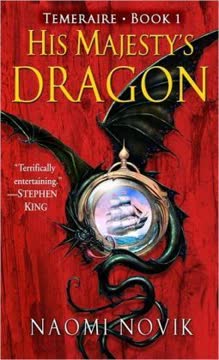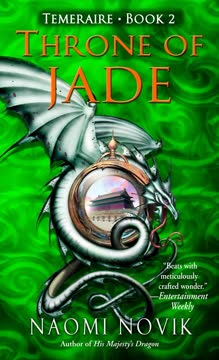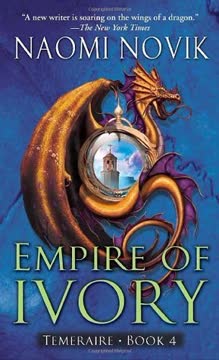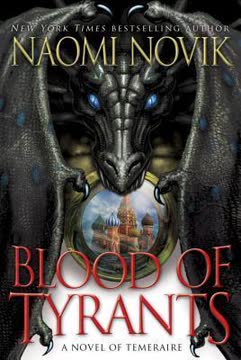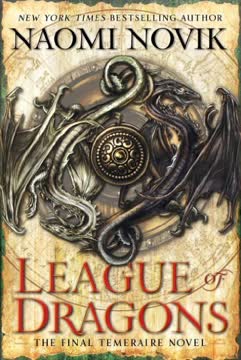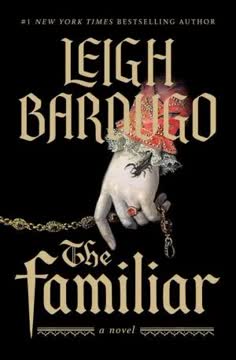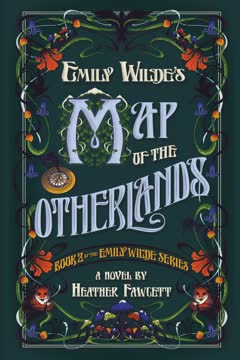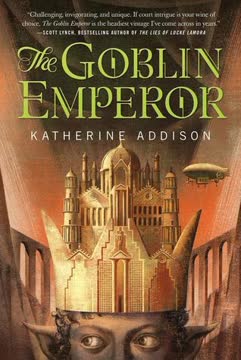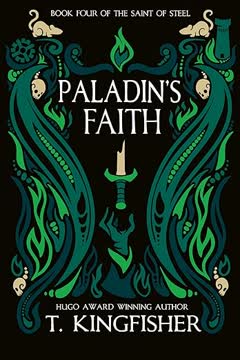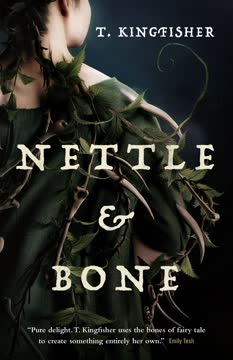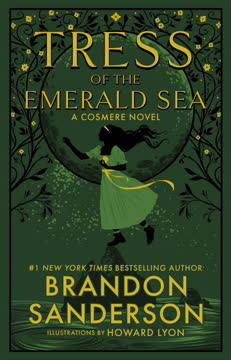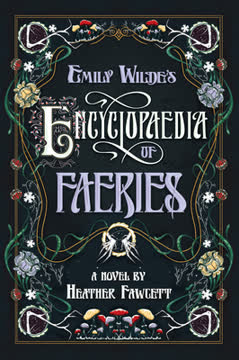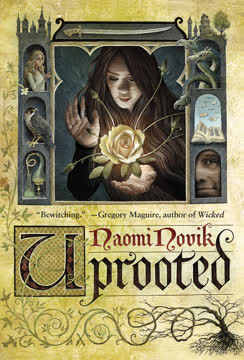Plot Summary
Battle's End, A New Beginning
Captain Will Laurence of the HMS Reliant captures the French frigate Amitié, a victory overshadowed by the discovery of a dragon egg among the spoils. The egg is close to hatching, and Laurence must decide who will harness the dragon, a decision that could alter the course of the war. This moment marks the beginning of a new chapter in Laurence's life, as he is thrust into the world of dragons and the Aerial Corps, leaving behind his naval career.
A Dragon's Unexpected Arrival
The dragon egg hatches aboard the Reliant, revealing a rare and intelligent dragonet. Despite the crew's attempts to have a midshipman harness the dragon, the creature, named Temeraire, chooses Laurence as his handler. This unexpected bond forces Laurence to leave his naval career behind and embrace a new life in the Aerial Corps, a decision that brings both honor and uncertainty as he navigates this uncharted territory.
The Bond of Man and Beast
As Laurence grapples with his new role, he and Temeraire form a deep bond, sharing conversations and experiences that transcend the typical handler-dragon relationship. Laurence's dedication to Temeraire is evident as he navigates the challenges of his new life, including the societal implications of his decision and the personal sacrifices it entails. Their relationship becomes the cornerstone of their journey, shaping their actions and decisions.
Navigating New Waters and Skies
Laurence and Temeraire arrive at Loch Laggan, a covert in Scotland, where they begin their training. Laurence faces the challenge of adapting to the informal and insular world of aviators, while Temeraire's unique abilities and intelligence set him apart from other dragons. Together, they must learn the skills necessary for aerial combat and cooperation within a dragon formation, forging a path in this new and demanding environment.
Training and Transformation
Under the guidance of the dragon Celeritas, Laurence and Temeraire undergo rigorous training to prepare for their role in the war. Temeraire's exceptional flying abilities and intelligence are revealed, while Laurence struggles to keep pace with the demands of his new life. The bond between man and dragon deepens as they face the challenges of their training together, transforming them into a formidable team.
Challenges of Rank and Respect
Laurence encounters resistance and prejudice from some aviators, who view him as an outsider due to his naval background. He must assert his authority and earn the respect of his peers while maintaining his integrity and dedication to Temeraire. The social dynamics within the Aerial Corps are complex, and Laurence must navigate them carefully to succeed, learning valuable lessons about leadership and camaraderie.
Aerial Battle and Tactical Retreat
Laurence and Temeraire, along with their formation, face a formidable French aerial force. The battle is intense, with dragons and their crews fighting fiercely. Despite their efforts, the French dragons, carrying troop transports, begin to gain the upper hand. Laurence and Temeraire manage to disable one transport, but the French numbers are overwhelming. The British forces are forced to retreat strategically, hoping to regroup and counter the French threat more effectively.
Temeraire's Unleashed Power
During the battle, Temeraire unleashes a powerful roar that shatters a French transport, revealing his unique Celestial ability known as the "divine wind." This unexpected power turns the tide momentarily, allowing the British forces to regroup. Temeraire's newfound ability is both a blessing and a mystery, as it holds the potential to change the course of the war. Laurence and Temeraire must now understand and harness this power to protect Britain.
Betrayal and Consequences
The covert is shaken by the revelation of Captain Choiseul's betrayal. He had planned to defect to France with Lily, but his plot is foiled. Choiseul's actions lead to his execution, leaving his dragon, Praecursoris, devastated. The betrayal highlights the complex loyalties within the Aerial Corps and the personal cost of war. Laurence and his comrades must grapple with the implications of Choiseul's actions and the impact on their own sense of duty and honor.
The Battle for Britain's Shores
The British dragons engage in a desperate battle to prevent Napoleon's forces from landing on British soil. Temeraire's divine wind ability proves crucial in disrupting the French transports, but the battle is fierce and costly. Despite their efforts, some French troops manage to land, and the fight continues on the ground. The British forces must hold the line until reinforcements arrive, showcasing their bravery and determination.
Revelations and New Beginnings
After the battle, Sir Edward Howe reveals that Temeraire is a Celestial dragon, a breed reserved for Chinese emperors. This revelation explains Temeraire's unique abilities and the significance of his presence in Britain. Laurence and Temeraire must navigate the political implications of this discovery while continuing to defend their country. The bond between them strengthens as they embrace their roles in shaping the future of the Aerial Corps and the war effort.
Characters
Will Laurence
Laurence is a man of duty and honor, initially a captain in the Royal Navy. His life takes an unexpected turn when he becomes the handler of the dragon Temeraire. Laurence is deeply committed to his new role, forming a strong bond with Temeraire and navigating the challenges of the Aerial Corps with determination and integrity. His leadership and strategic acumen are crucial in the battles against Napoleon's forces.
Temeraire
Temeraire is a Chinese Imperial dragon, known for his intelligence and unique abilities, including the "divine wind." He forms a deep bond with Laurence, choosing him as his handler. Temeraire's curiosity and keen mind set him apart from other dragons, and he is devoted to Laurence, sharing a relationship that is both profound and transformative. His presence in Britain carries significant political implications.
Celeritas
Celeritas is a seasoned dragon who oversees the training at Loch Laggan. He is knowledgeable and experienced, guiding Laurence and Temeraire through their rigorous training regimen. Celeritas's leadership is instrumental in helping them develop the skills necessary for aerial combat, and his wisdom is a guiding force for the new recruits.
Admiral Powys
Admiral Powys is a senior figure in the Aerial Corps, responsible for overseeing operations and training. He is pragmatic and focused on the strategic needs of the Corps, ensuring that Laurence and Temeraire are prepared for their roles in the war effort. His leadership is crucial in maintaining the effectiveness of the British forces.
Captain Berkley
Berkley is the captain of the Regal Copper dragon Maximus. He is a seasoned aviator who becomes an ally to Laurence, offering guidance and support as they train together. Berkley's practical approach and dedication to his dragon mirror Laurence's own values, and his experience is invaluable in the battles they face.
Captain Jeremy Rankin
Rankin is an aviator with a noble background, known for his charm and social graces. However, his neglectful treatment of his dragon, Levitas, reveals a lack of true dedication to his role, contrasting sharply with Laurence's commitment to Temeraire. Rankin's character serves as a foil to Laurence, highlighting the importance of the bond between dragon and handler.
Captain Catherine Harcourt
Harcourt is a rare female captain in the Aerial Corps, commanding the Longwing dragon Lily. She is determined and capable, navigating the challenges of her role with resilience. Her presence highlights the unique demands placed on women in the Corps and the strength required to succeed in a male-dominated field.
Levitas
Levitas is a small Winchester dragon under Rankin's command. Despite his neglect, Levitas remains loyal and eager to please, highlighting the disparity between his treatment and the care Laurence provides to Temeraire. Levitas's story underscores the importance of the bond between dragon and handler.
Lieutenant Granby
Granby is a lieutenant in the Aerial Corps who initially resents Laurence's presence due to his naval background. Despite this, Granby is a skilled aviator, and his interactions with Laurence reflect the broader tensions within the Corps. Over time, Granby comes to respect Laurence's abilities and dedication.
Jane Roland
Captain Jane Roland is a seasoned aviator and a key figure in the Aerial Corps. Her leadership and experience are invaluable in the battles against Napoleon's forces. Roland's relationship with Laurence is one of mutual respect and camaraderie, as they navigate the challenges of war together.
Plot Devices
Dragon Bonding
The bond between Laurence and Temeraire is central to the narrative, driving the plot and character development. This connection is both emotional and practical, influencing their actions and decisions as they navigate the challenges of their new roles. The bond is a source of strength and resilience.
Aerial Training
The training at Loch Laggan is a key plot device, illustrating the demands placed on Laurence and Temeraire as they prepare for their roles in the war. The training sequences highlight their growth and the development of their skills, setting the stage for future conflicts. The rigorous preparation is essential for their success in battle.
Social Dynamics
The social dynamics within the Aerial Corps, including issues of rank, respect, and prejudice, are significant plot devices. Laurence's interactions with other aviators and his efforts to earn their respect reflect broader themes of acceptance and belonging. These dynamics add depth to the narrative and challenge the characters.
Divine Wind
The divine wind is a rare ability possessed by Celestial dragons, allowing them to unleash a powerful roar that can shatter objects and disrupt enemy formations. This ability is central to the narrative, as it provides a strategic advantage in the battles against Napoleon's forces. The discovery of Temeraire's power adds a new dimension to the war effort.
Betrayal and Loyalty
The theme of betrayal and loyalty is explored through Choiseul's actions and the impact on the Aerial Corps. His treachery highlights the personal and political challenges faced by the characters, as they navigate the complexities of war and the demands of duty. The bond between dragons and their handlers is tested, underscoring the importance of trust and loyalty in the face of adversity.
Political Intrigue
The revelation of Temeraire's Celestial nature introduces a layer of political intrigue, as the characters must navigate the potential consequences of his presence in Britain. The political ramifications of Temeraire's abilities and status add complexity to the narrative, as Laurence and Temeraire must balance their roles in the war effort with the diplomatic challenges posed by their unique situation.
Analysis
"His Majesty's Dragon" by Naomi Novik is a rich exploration of duty, loyalty, and identity set against the backdrop of an alternate history where dragons play a pivotal role in warfare. The novel delves into the complexities of human-dragon relationships, highlighting the deep bond between Laurence and Temeraire as a central theme. Through their journey, the story examines the challenges of navigating societal expectations and personal sacrifices, as well as the importance of trust and loyalty in the face of adversity. The narrative also addresses issues of prejudice and hierarchy within the Aerial Corps, offering a commentary on acceptance and belonging. Temeraire's unique abilities and Celestial status introduce political intrigue, adding depth to the story and raising questions about power and responsibility. Overall, the novel is a compelling blend of adventure, character development, and thematic exploration, offering readers a thought-provoking and engaging experience.
Last updated:
FAQ
Synopsis & Basic Details
What is His Majesty's Dragon about?
- An Unexpected Discovery: Captain Will Laurence, a distinguished naval officer, captures a French frigate and discovers a rare dragon egg on board, forcing him to become its handler as it hatches and imprints on him.
- A New Path Forged: Renouncing his esteemed naval career, Laurence is thrust into the unconventional world of the Aerial Corps, where he and his dragon, Temeraire, must learn to navigate new social dynamics, rigorous training, and the unique challenges of aerial warfare.
- Britain's Aerial Defense: Set during the Napoleonic Wars, the story follows Laurence and Temeraire as they train and eventually engage in desperate battles against Napoleon's dragon-borne invasion forces, uncovering Temeraire's extraordinary abilities and the political intrigue surrounding his true nature.
Why should I read His Majesty's Dragon?
- Unforgettable Human-Dragon Bond: The novel offers a deeply emotional and intellectual partnership between Laurence and Temeraire, exploring themes of loyalty, duty, and mutual respect that transcend species.
- Rich Alternate History: Naomi Novik masterfully blends historical accuracy of the Napoleonic era with the fantastical element of intelligent, speaking dragons, creating a vivid and immersive world that feels both familiar and wondrous.
- Thrilling Aerial Combat: Experience exhilarating descriptions of dragon battles, intricate formation flying, and strategic aerial warfare that provide a fresh perspective on military fiction.
What is the background of His Majesty's Dragon?
- Napoleonic Era Warfare: The story is set against the backdrop of the early 19th-century Napoleonic Wars, where Britain and France are locked in a struggle for dominance, with dragons serving as powerful, intelligent weapons of war.
- Integrated Dragon Society: Dragons are not mere beasts but sentient beings with their own social structures, ranks, and even political leanings, deeply integrated into military and, to a lesser extent, civilian life, particularly within the specialized Aerial Corps.
- Class and Duty Conflicts: The narrative explores the rigid class structures and societal expectations of Regency England, contrasting the traditional naval career of a gentleman with the unconventional, often socially marginalized, life of an aviator.
What are the most memorable quotes in His Majesty's Dragon?
- "I would rather have you than any ship in the Navy.": This powerful declaration by Laurence to Temeraire in Chapter 3 encapsulates his profound shift in loyalty and affection, signifying his complete acceptance of his new life and bond over his former career and societal expectations.
- "I am not going to stay in Scotland if you are unhappy there.": Temeraire's fiercely loyal and independent statement in Chapter 4 highlights his deep devotion to Laurence and his burgeoning sense of self, challenging the traditional notion of dragons as mere property.
- "You are indeed a very Jacobin at heart, and I think I must give up trying to cure you of it; I can but wash my hands and deny responsibility.": Laurence's amused yet resigned remark to Temeraire in Chapter 11 playfully acknowledges Temeraire's revolutionary ideas about dragon rights and societal fairness, showcasing their intellectual connection and Temeraire's unique philosophical bent.
What writing style, narrative choices, and literary techniques does Naomi Novik use?
- Elegant, Period-Appropriate Prose: Novik employs a formal yet accessible style reminiscent of early 19th-century literature, lending authenticity to the alternate historical setting while maintaining readability. This is evident in Laurence's internal monologues and dialogue, such as his reflections on duty and society.
- Deep Character Point of View: The narrative is primarily told from Laurence's perspective, offering intimate access to his internal conflicts, moral dilemmas, and emotional journey as he adapts to his new life and deepens his bond with Temeraire. This allows readers to experience his transformation firsthand, from naval captain to aviator.
- Seamless Integration of Fantasy: Novik masterfully weaves dragons into a meticulously researched historical backdrop, treating them not as mere plot devices but as fully realized, intelligent beings with distinct personalities and societal roles, enhancing the world-building without sacrificing historical verisimilitude.
Hidden Details & Subtle Connections
What are some minor details that add significant meaning?
- Giles's Fear of Dragons: Laurence's steward, Giles, trembles when serving dinner near Temeraire's cot in Chapter 1, and Laurence considers asking him to come along but dismisses the idea due to the man being "spooked by the creatures." This subtle detail highlights the pervasive societal fear and discomfort surrounding dragons, even among those serving aviators, underscoring the isolation Laurence faces.
- The Roman Baths at Loch Laggan: Martin's casual mention in Chapter 5 that the baths were "built by the Romans, you know; and they are why we are all here at all" reveals a deep historical continuity for the Aerial Corps, suggesting dragons have been integrated into British society for millennia, far predating modern military structures. This grounds the fantastical elements in a sense of ancient tradition and purpose.
- Laurence's Packing Habits: When preparing to leave Madeira in Chapter 4, Laurence meticulously packs his sea-chest, only to be met with Portland's puzzled look and suggestion to "just throw the rest of your things into a few bags." This small interaction subtly illustrates the clash between the Navy's rigid order and the Aerial Corps' more pragmatic, less formal approach, reflecting Laurence's ongoing adaptation.
What are some subtle foreshadowing and callbacks?
- Celeritas's Warning on Surprise Attacks: During Temeraire's initial training in Chapter 5, Celeritas emphasizes the importance of testing a dragon's "natural reaction to being startled from above, where we cannot see; it is an instinct that often cannot be overcome by any training." This directly foreshadows the Grand Chevalier's devastating surprise attack from above in the Battle of Dover, highlighting the critical vulnerability of formations to such tactics.
- Temeraire's "Jacobin" Tendencies: Laurence playfully calls Temeraire a "Jacobin at heart" in Chapter 4 after the dragon questions the concept of ownership and duty to the King, suggesting that if they were unhappy in Scotland, they could simply leave. This foreshadows Temeraire's later, more serious philosophical debates about dragon rights and the fairness of human laws, revealing his innate sense of justice and independence.
- Rankin's Neglect of Levitas: Rankin's casual disregard for Levitas's comfort and well-being, observed by Laurence in Chapter 5 and 6, subtly foreshadows his later cowardice and lack of true dedication during the invasion. It establishes a pattern of self-serving behavior that contrasts sharply with Laurence's deep commitment to Temeraire, making Rankin's eventual fate feel earned.
What are some unexpected character connections?
- Celeritas's Personal History with Rankin's Family: In Chapter 7, Celeritas reveals that Rankin's grandfather was his "first handler" and his son also served with him, explaining his initial hopes for Rankin despite his later disappointment. This deep, multi-generational connection adds a layer of personal tragedy and regret to Celeritas's character, showing that even dragons feel the weight of human failings and lost potential.
- Jane Roland's Maternal Bond with Emily: The revelation in Chapter 10 that Captain Jane Roland is Emily Roland's mother, and that Emily is being groomed to be Excidium's next captain, highlights the unique familial structures within the Aerial Corps. This connection underscores the long-term commitment required of aviator families and the emotional investment in ensuring a dragon's continued well-being through inherited handlers.
- Choiseul's Past as a Royalist Refugee: Captain Choiseul, the French traitor, is revealed in Chapter 8 to be a royalist who fled France after the Revolution, having been granted asylum by Austria. This background adds complexity to his betrayal, showing it as a desperate act driven by fear for Praecursoris's life under Bonaparte's regime, rather than simple malice, connecting his personal history to the broader political turmoil.
Who are the most significant supporting characters?
- Hollin, the Dedicated Ground Crewman: Hollin, initially a nameless ground crewman, rises to become Temeraire's harness-master due to his exceptional diligence, kindness to Levitas, and genuine concern for dragons. His promotion by Laurence in Chapter 11, based on merit rather than birth, subtly challenges the rigid class system and highlights the value of true dedication within the Corps.
- Emily Roland, the Aspiring Cadet: Emily, one of Laurence's runners, is a young female cadet who displays courage, enthusiasm, and a deep affection for dragons, particularly her mother's Longwing, Excidium. Her presence, and the revelation of her intended future as Excidium's handler, showcases the unique role of women in the Aerial Corps and the generational legacy of dragon handling.
- Lieutenant John Granby, the Redeemed Officer: Granby initially harbors resentment towards Laurence due to his naval background and the perceived slight to Dayes. However, his professionalism during the Victoriatus rescue and his sincere apology in Chapter 7 mark a significant character arc, transforming him into a loyal and capable first lieutenant for Temeraire, embodying the theme of earning respect through shared experience.
Psychological, Emotional, & Relational Analysis
What are some unspoken motivations of the characters?
- Admiral Croft's Financial Self-Interest: Admiral Croft's initial anger and subsequent quick recovery upon hearing of Temeraire's harnessing in Chapter 3 is driven by his calculation of his "admiral's share" of the prize money. His primary motivation is personal gain, not genuine concern for Laurence's career or the Corps, subtly revealing the underlying corruption and self-serving nature within parts of the naval hierarchy.
- Captain Rankin's Social Insecurity: Rankin's neglect of Levitas and his disdainful remarks about dragons in Chapter 6, despite his noble background, stem from a deep-seated insecurity and a desire to distance himself from the "uncivilized" aspects of aviator life. His actions are motivated by a need to maintain a veneer of aristocratic detachment, contrasting with the genuine bonds formed by other aviators.
- Choiseul's Fear for Praecursoris: Choiseul's betrayal in Chapter 9, while seemingly driven by loyalty to France, is ultimately motivated by a desperate fear for Praecursoris's life under Bonaparte's regime, where dragons could be executed for treason. His actions are a tragic attempt to secure his dragon's future, highlighting the profound, often desperate, loyalty between handler and beast.
What psychological complexities do the characters exhibit?
- Laurence's Internalized Class Prejudice: Despite his inherent fairness and dedication, Laurence initially struggles with the informal manners and lower social standing of aviators, as seen in his discomfort with Granby's rudeness and his own meticulous packing habits in Chapter 4. This reveals a deep-seated, unconscious class prejudice that he must actively overcome to fully integrate into his new life and appreciate his comrades.
- Temeraire's Existential Self-Doubt: Temeraire, despite
Synopsis & Basic Details
What is His Majesty's Dragon about?
- An Unexpected Discovery: Captain Will Laurence, a distinguished naval officer, captures a French frigate and discovers a rare dragon egg on board, forcing him to become its handler as it hatches and imprints on him.
- A New Path Forged: Renouncing his esteemed naval career, Laurence is thrust into the unconventional world of the Aerial Corps, where he and his dragon, Temeraire, must learn to navigate new social dynamics, rigorous training, and the unique challenges of aerial warfare.
- Britain's Aerial Defense: Set during the Napoleonic Wars, the story follows Laurence and Temeraire as they train and eventually engage in desperate battles against Napoleon's dragon-borne invasion forces, uncovering Temeraire's extraordinary abilities and the political intrigue surrounding his true nature.
Why should I read His Majesty's Dragon?
- Unforgettable Human-Dragon Bond: The novel offers a deeply emotional and intellectual partnership between Laurence and Temeraire, exploring themes of loyalty, duty, and mutual respect that transcend species.
- Rich Alternate History: Naomi Novik masterfully blends historical accuracy of the Napoleonic era with the fantastical element of intelligent, speaking dragons, creating a vivid and immersive world that feels both familiar and wondrous.
- Thrilling Aerial Combat: Experience exhilarating descriptions of dragon battles, intricate formation flying, and strategic aerial warfare that provide a fresh perspective on military fiction.
What is the background of His Majesty's Dragon?
- Napoleonic Era Warfare: The story is set against the backdrop of the early 19th-century Napoleonic Wars, where Britain and France are locked in a struggle for dominance, with dragons serving as powerful, intelligent weapons of war.
- Integrated Dragon Society: Dragons are not mere beasts but sentient beings with their own social structures, ranks, and even political leanings, deeply integrated into military and, to a lesser extent, civilian life, particularly within the specialized Aerial Corps.
- Class and Duty Conflicts: The narrative explores the rigid class structures and societal expectations of Regency England, contrasting the traditional naval career of a gentleman with the unconventional, often socially marginalized, life of an aviator.
What are the most memorable quotes in His Majesty's Dragon?
- "I would rather have you than any ship in the Navy.": This powerful declaration by Laurence to Temeraire in Chapter 3 encapsulates his profound shift in loyalty and affection, signifying his complete acceptance of his new life and bond over his former career and societal expectations.
- "I am not going to stay in Scotland if you are unhappy there.": Temeraire's fiercely loyal and independent statement in Chapter 4 highlights his deep devotion to Laurence and his burgeoning sense of self, challenging the traditional notion of dragons as mere property.
- "You are indeed a very Jacobin at heart, and I think I must give up trying to cure you of it; I can but wash my hands and deny responsibility.": Laurence's amused yet resigned remark to Temeraire in Chapter 11 playfully acknowledges Temeraire's revolutionary ideas about dragon rights and societal fairness, showcasing their intellectual connection and Temeraire's unique philosophical bent.
What writing style, narrative choices, and literary techniques does Naomi Novik use?
- Elegant, Period-Appropriate Prose: Novik employs a formal yet accessible style reminiscent of early 19th-century literature, lending authenticity to the alternate historical setting while maintaining readability. This is evident in Laurence's internal monologues and dialogue, such as his reflections on duty and society.
- Deep Character Point of View: The narrative is primarily told from Laurence's perspective, offering intimate access to his internal conflicts, moral dilemmas, and emotional journey as he adapts to his new life and deepens his bond with Temeraire. This allows readers to experience his transformation firsthand, from naval captain to aviator.
- Seamless Integration of Fantasy: Novik masterfully weaves dragons into a meticulously researched historical backdrop, treating them not as mere plot devices but as fully realized, intelligent beings with distinct personalities and societal roles, enhancing the world-building without sacrificing historical verisimilitude.
Hidden Details & Subtle Connections
What are some minor details that add significant meaning?
- Giles's Fear of Dragons: Laurence's steward, Giles, trembles when serving dinner near Temeraire's cot in Chapter 1, and Laurence considers asking him to come along but dismisses the idea due to the man being "spooked by the creatures." This subtle detail highlights the pervasive societal fear and discomfort surrounding dragons, even among those serving aviators, underscoring the isolation Laurence faces.
- The Roman Baths at Loch Laggan: Martin's casual mention in Chapter 5 that the baths were "built by the Romans, you know; and they are why we are all here at all" reveals a deep historical continuity for the Aerial Corps, suggesting dragons have been integrated into British society for millennia, far predating modern military structures. This grounds the fantastical elements in a sense of ancient tradition and purpose.
- Laurence's Packing Habits: When preparing to leave Madeira in Chapter 4, Laurence meticulously packs his sea-chest, only to be met with Portland's puzzled look and suggestion to "just throw the rest of your things into a few bags." This small interaction subtly illustrates the clash between the Navy's rigid order and the Aerial Corps' more pragmatic, less formal approach, reflecting Laurence's ongoing adaptation.
What are some subtle foreshadowing and callbacks?
- Celeritas's Warning on Surprise Attacks: During Temeraire's initial training in Chapter 5, Celeritas emphasizes the importance of testing a dragon's "natural reaction to being startled from above, where we cannot see; it is an instinct that often cannot be overcome by any training." This directly foreshadows the Grand Chevalier's devastating surprise attack from above in the Battle of Dover, highlighting the critical vulnerability of formations to such tactics.
- Temeraire's "Jacobin" Tendencies: Laurence playfully calls Temeraire a "Jacobin at heart" in Chapter 4 after the dragon questions the concept of ownership and duty to the King, suggesting that if they were unhappy in Scotland, they could simply leave. This foreshadows Temeraire's later, more serious philosophical debates about dragon rights and the fairness of human laws, revealing his innate sense of justice and independence.
- Rankin's Neglect of Levitas: Rankin's casual disregard for Levitas's comfort and well-being, observed by Laurence in Chapter 5 and 6, subtly foreshadows his later cowardice and lack of true dedication during the invasion. It establishes a pattern of self-serving behavior that contrasts sharply with Laurence's deep commitment to Temeraire, making Rankin's eventual fate feel earned.
What are some unexpected character connections?
- Celeritas's Personal History with Rankin's Family: In Chapter 7, Celeritas reveals that Rankin's grandfather was his "first handler" and his son also served with him, explaining his initial hopes for Rankin despite his later disappointment. This deep, multi-generational connection adds a layer of personal tragedy and regret to Celeritas's character, showing that even dragons feel the weight of human failings and lost potential.
- Jane Roland's Maternal Bond with Emily: The revelation in Chapter 10 that Captain Jane Roland is Emily Roland's mother, and that Emily is being groomed to be Excidium's next captain, highlights the unique familial structures within the Aerial Corps. This connection underscores the long-term commitment required of aviator families and the emotional investment in ensuring a dragon's continued well-being through inherited handlers.
- Choiseul's Past as a Royalist Refugee: Captain Choiseul, the French traitor, is revealed in Chapter 8 to be a royalist who fled France after the Revolution, having been granted asylum by Austria. This background adds complexity to his betrayal, showing it as a desperate act driven by fear for Praecursoris's life under Bonaparte's regime, rather than simple malice, connecting his personal history to the broader political turmoil.
Who are the most significant supporting characters?
- Hollin, the Dedicated Ground Crewman: Hollin, initially a nameless ground crewman, rises to become Temeraire's harness-master due to his exceptional diligence, kindness to Levitas, and genuine concern for dragons. His promotion by Laurence in Chapter 11, based on merit rather than birth, subtly challenges the rigid class system and highlights the value of true dedication within the Corps.
- Emily Roland, the Aspiring Cadet: Emily, one of Laurence's runners, is a young female cadet who displays courage, enthusiasm, and a deep affection for dragons, particularly her mother's Longwing, Excidium. Her presence, and the revelation of her intended future as Excidium's handler, showcases the unique role of women in the Aerial Corps and the generational legacy of dragon handling.
- Lieutenant John Granby, the Redeemed Officer: Granby initially harbors resentment towards Laurence due to his naval background and the perceived slight to Dayes. However, his professionalism during the Victoriatus rescue and his sincere apology in Chapter 7 mark a significant character arc, transforming him into a loyal and capable first lieutenant for Temeraire, embodying the theme of earning respect through shared experience.
Psychological, Emotional, & Relational Analysis
What are some unspoken motivations of the characters?
- Admiral Croft's Financial Self-Interest: Admiral Croft's initial anger and subsequent quick recovery upon hearing of Temeraire's harnessing in Chapter 3 is driven by his calculation of his "admiral's share" of the prize money. His primary motivation is personal gain, not genuine concern for Laurence's career or the Corps, subtly revealing the underlying corruption and self-serving nature within parts of the naval hierarchy.
- Captain Rankin's Social Insecurity: Rankin's neglect of Levitas and his disdainful remarks about dragons in Chapter 6, despite his noble background, stem from a deep-seated insecurity and a desire to distance himself from the "uncivilized" aspects of aviator life
Review Summary
His Majesty's Dragon received mostly positive reviews, praised for its unique premise of dragons in the Napoleonic Wars. Readers enjoyed the relationship between Captain Laurence and Temeraire, finding it heartwarming and well-developed. The historical detail and world-building were commended, though some found the pacing slow at times. Many compared it favorably to other dragon-focused series. While some criticized the lack of action or found the writing style dated, most reviewers recommended it as an engaging and original fantasy read.
Temeraire Series
Similar Books
Download PDF
Download EPUB
.epub digital book format is ideal for reading ebooks on phones, tablets, and e-readers.
